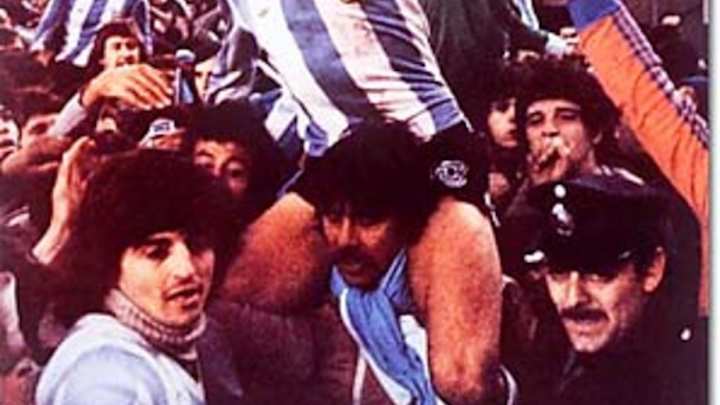Did dictators fix World Cup titles for Italy, Argentina?


Soccer's biggest prize may have twice been won with the help of dictators fixing matches for the host team.
Argentina's triumph in 1978 and Italy's in 1934 were said to be influenced by military leaders seeking propaganda coups, delegates were told Thursday at a symposium titled "The Relevance and Impact of FIFA World Cups.''
"It's the same old story: Sport and politics are brothers and sometimes sport is under the other brother,'' Italian writer Marco Impiglia told The Associated Press.
Impiglia presented a paper suggesting Benito Mussolini ensured favorable refereeing decisions, helping the Italian team win.
Raanan Rein, an Israeli professor of Latin American history, said he was "100 percent persuaded'' that Argentina's military junta influenced a 6-0 win against Peru. The match is a notorious chapter of World Cup lore and ensured Argentina advanced to the final instead of great rival Brazil.
Still, Rein and Impiglia said their claims lack documentary proof.
The four-day gathering of academics and historians is studying the political, social and economic impact on nations that have hosted the biggest and most-watched sports event since the World Cup was first played in Uruguay in 1930.
FIFA's choice of Brazil, Russia and Qatar - three countries with growing economies and diplomatic influence - as the next hosts from 2014 to 2022 suggests soccer and politics will continue to mix.
"It tells me that in terms of the global presence of football since the 1930s, FIFA has made a big step forward,'' said conference co-organizer Stefan Rinke, a professor of Latin American history at Free University in Berlin.
Opening the conference on Wednesday, FIFA secretary general Jerome Valcke acknowledged that working with democratically elected governments can complicate organizing tournaments that require billions of dollars of investment in stadiums, airports, roads and hotels.
Dictator-led hosts presented a different kind of challenge, delegates were told.
Rein said the generals who seized power in Argentina in 1976 needed a propaganda victory two years later to appease their people and a global community angered by the regime's often brutal treatment of opponents.
They collaborated with "at least one foreign government'' to fix the Peru match, Rein said, as Argentina needed to win by four goals.
"According to many people I spoke with in Argentina ... there is in fact no question about it,'' said Rein, adding that many activists were conflicted by their affection for the players to speak out. "It not only stains the military regime but it also stains the national team, and they had a great national team. In many ways, they deserved to win the World Cup.''
The junta fell in 1983, after a military defeat against Britain, and Rein speculated it could have gone sooner but for the extra-time victory in the `78 final against the Netherlands.
"Not winning the World Cup might have had somewhat similar consequences like being defeated in the Falklands, or Malvinas, islands in mid-1982,'' he said.
Mussolini described soccer as "unmanly,'' yet recognized its popularity and potential to create "a myth of a new Italy'' when FIFA chose the 1934 host, Impiglia said.
"The fascist regime made a political abuse of the event,'' Impiglia said. "It was a questionable win and it raised many doubts at the time.''
